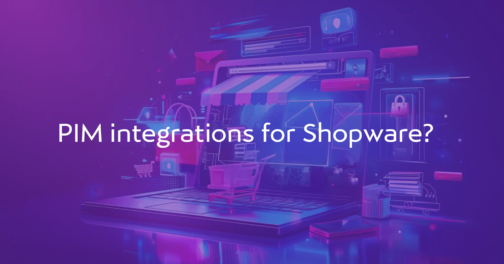Greetings! I'm Aneesh Sreedharan, CEO of 2Hats Logic Solutions. At 2Hats Logic Solutions, we are dedicated to providing technical expertise and resolving your concerns in the world of technology. Our blog page serves as a resource where we share insights and experiences, offering valuable perspectives on your queries.
What are the best PIM integrations for Shopware?
PIM integrations enhance productivity, reduce manual data entry, and ensure consistent product information across multiple channels. Integrating a PIM like Akeneo or Pimcore with Shopware can do just that. Which solution is right for your business? Continue reading to find out.
What is PIM (Product Information Management)?
A PIM, or Product Information Management, is the system that unifies and controls all the product information. Companies use PIM so that all product information on different sales channels is correct.
For an online store with the PIM system, the product description, photos, prices, and specs are always correct and current on all channels.
| Pro Tip Pair your PIM with a robust content management strategy to improve SEO and user experience across your sales channels. |
The Role of PIM in Modern E-commerce
With PIM integration, online stores can efficiently manage all their products, especially when they expand into different channels like websites, marketplaces, social media, and more. PIM tools will reduce the pain of manually entering data, minimizing errors. This will make scaling e-commerce businesses easier.
Key Benefits and Features
- Centralized Data Management: All product data is saved in a single location, ensuring platform consistency.
- Multichannel Integration: Product information may be easily shared across numerous sales channels, such as Shopware, Amazon, and social media.
- Real-time Access: Departments can now easily examine and edit existing product data for a more efficient workflow across departments.
- Localization Support: PIM provides translation and region-specific product detail management services for online businesses.
| Pro Tip Before choosing a PIM, audit your product catalog to identify inconsistencies and inefficiencies. This will help you select a PIM tailored to your specific needs. |
Importance of PIM for Online Stores
As e-commerce businesses evolve, firms face the issue of managing increasingly complex product catalogs across several platforms. PIM integration for Shopware reduces operational inefficiencies by automatically syncing data across all touchpoints. Whether in a small store or a large business, the PIM system ensures accurate product information, reducing abandoned carts and improving consumer satisfaction.
Common Challenges PIM Solves
- Inconsistent Data Across Channels: PIM synchronizes and updates all product data across all platforms.
- Time-Consuming Manual Updates: Automating data updates saves time and reduces errors.
- Product Data Localization: Simplifies managing product descriptions in different languages and regions.
PIM and Shopware
Why Shopware Needs PIM?
Shopware is flexible and scalable, making it a popular choice among e-commerce enterprises. When businesses expand, managing large product catalogs becomes increasingly important. PIM for Shopware simplifies managing large product catalogs, especially for businesses expanding to multiple channels like websites, marketplaces, and social media.
Is your Shopware store ready for a PIM upgrade?
Integration Benefits
- Multichannel Distribution: Save all product data in one place for easier updates across your Shopware product catalog integration.
- Efficiency: It reduces manual entry, and you can update product information in real-time.
- Accuracy: Product information is consistent across all channels, which decreases the possibility of inconsistencies.
Technical Requirements
Improve your Shopware PIM integration with an up-to-date version corresponding to the chosen PIM system. To ensure smooth integration, you may need to install specific extensions or work with a Shopware development expert.
Top PIM Solutions for Shopware
| PIM System | Key Features | Integration with Shopware | Pricing |
| Akeneo PIM | Open-source flexibility, multichannel support | Direct Shopware connector for smooth synchronization | Free basic plan; enterprise options from $45,000/year |
| Pimcore | Enterprise-level customization, powerful data management features | Customizable for deeper integration with Shopware | Open-source; custom pricing for enterprise features |
| Salsify | Specializes in product experience management, real-time updates across multiple channels | Integration depends on product data complexity. | Subscription-based; pricing varies by products/channels |
| InRiver | Tailored product content creation for multiple regions | Custom integration capabilities based on regional content needs | Tiered pricing is based on the size of the product catalog and the features required. |
| Pro Tip Use trial versions or demos to test the features and user interface of these PIM systems before committing to a subscription. |
Real-world examples
- Akeneo: Smallable
Smallable took on the enormous task of categorizing massive products into significant categories, which hindered updating and maintaining the product’s correctness. Smallable optimized product information management by implementing Akeneo PIM, updating and managing multiple attributes.
- Pimcore: Vespa
Vespa is a strong lifestyle brand. The consumer had to go through lengthy procedures to purchase a product from this organization, which increased cart abandonment. Vespa created the online configurator based on Pimcore, which allows users to customize their scooter using high-quality photos, imitating an in-store experience.
- Salsify: Mars, Incorporated
Mars had to manage vast product information across multiple platforms. They used Salsify to improve product data administration and maintain marketplace compliance.
- inRiver: Yamaha
Yamaha is a global B2B corporation with a large product range and a broad network of affiliates; they were functioning inefficiently due to product information being managed through spreadsheets and internal databases. Yamaha used inRiver PIM to consolidate product data management, allowing scalability, consistency, and real-time updates across all global operations.
| Stop wasting time on manual updates! Let us help you integrate the right PIM system for your Shopware store. |
Choosing the Right PIM for Shopware Store
Selection Criteria
- Compatibility with Shopware: Ensure your PIM system has a proven integration with Shopware.
- Scalability: Choose a solution that grows with your business needs.
- Multichannel Support: Look for strong integration capabilities with other sales platforms.
Integrate your PIM system into your Shopware store before Halloween and Black Friday to ensure easy product management, during these peak shopping seasons.
Conclusion
Integrating a PIM system with your Shopware store can significantly improve managing product data. From centralizing information to ensuring consistency across channels, PIM tools ease operations and enhance customer experience. Evaluate your business needs, review top PIM solutions, and choose them based on your goals.
By implementing the right PIM integration for Shopware, your e-commerce store can achieve higher efficiency, product consistency, and a better shopping experience. However, to optimize the use of these tools, consult with a Shopware agency to assist in the integration and customization of your PIM system.
FAQs
What should I consider when choosing a PIM system for my Shopware store?
The main aspects are integration ease, scalability, user-friendliness, customization, and support level. Prioritize features depending on your company’s size and specific demands.
What is a PIM system, and why is it important for Shopware?
A Product Information Managementsystem centralizes and organizes product data, ensuring consistency across numerous channels. For Shopware users, a PIM is crucial for handling product details, streamlining workflows, and improving the accuracy of product information.
Which PIM systems are best for Shopware integration?
Among the best solutions, Akeneo and Pimcore are quite compatible with Shopware. The former is user-friendly and scalable; the latter is valued for its flexibility and robust capabilities, such as digital asset management.
Can a PIM system improve my Shopware store’s SEO?
Yes, a PIM can help ensure that all product information, including descriptions, titles, and meta tags, is accurate and consistent, which can improve your Shopware store’s SEO performance by providing search engines with reliable and comprehensive data.
How does a PIM system help with scaling an e-commerce business on Shopware?
As your product catalog grows, the PIM system helps ensure that managing thousands of products remains easy and efficient by automating data entry, improving data consistency, and reducing errors. In short, that is how you can scale up without compromising quality or accuracy.

Related Articles







